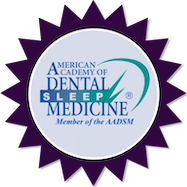Welcome to Fuller Sleep & TMJ Solutions | Greensboro, NC | frontdesk@fullersleep.com
Achieving Better Sleep Quality with Oral Appliance Therapy for Sleep Apnea

As much as we all love a good night's sleep, it's not always that easy to achieve, is it? Especially if you're grappling with sleep apnea, a condition that can really throw a wrench in your snooze routine. Now, many folks assume that a CPAP machine is their only salvation, but we've got some good news—there's another solution out there. Enter oral appliance therapy, a lesser-known but highly effective treatment for sleep apnea.
Developed by health professionals passionate about helping you achieve restful sleep, oral appliance therapy is a non-invasive treatment that helps to manage sleep apnea. It works by positioning the jaw in a way that maintains an open, unobstructed airway while you sleep. No noise, no surgery, just a simple device which can significantly improve your sleep quality.
So, if you're tired of being tired, if you're fed up with feeling like a zombie because of sleep apnea, it might be time to explore what oral appliance therapy can do for you. It's not just about getting more sleep—it's about improving your overall health, because, believe it or not, good sleep is a critical part of that.
How Oral Appliance Therapy Enhances Sleep Quality in Sleep Apnea Patients
1. How Oral Appliance Therapy Works for Sleep Apnea
Oral appliance therapy involves the use of custom-fitted dental devices to treat sleep apnea by maintaining an open airway during sleep. These appliances function by repositioning the lower jaw and/or tongue, preventing the collapse of the tissues at the back of the throat that often causes sleep apnea symptoms. As a result, oral appliances provide improved airflow and reduce the occurrence of sleep disruptions, leading to better sleep quality and overall well-being.
2. Types of Custom Oral Appliances for Sleep Apnea
Dr. Fuller may prescribe one of the following types of custom oral appliances to manage your sleep apnea symptoms:
- Mandibular advancement devices (MADs): As the most commonly prescribed oral appliance for sleep apnea, MADs function by gently moving the lower jaw forward, which helps maintain an open airway during sleep.
- Tongue-retaining devices (TRDs): These appliances hold the tongue in a forward position to prevent it from collapsing towards the throat, effectively maintaining an open airway.
3. Obtaining a Custom Oral Appliance: The Process
To ensure optimal results in managing sleep apnea, Dr. Fuller follows a thorough process in prescribing custom oral appliances:
- Comprehensive evaluation: An initial consultation will assess your sleep apnea severity, symptoms, and medical history. Dr. Fuller will perform a detailed examination of your oral structures to determine if oral appliance therapy is right for you.
- Accurate impressions: State-of-the-art technology enables precise impressions of your teeth and jaws, forming the foundation for your custom oral appliance.
- Appliance fabrication: Your impressions are sent to a specialized dental laboratory, where expert technicians craft the custom oral appliance to Dr. Fuller's specifications.
- Fitting and adjustments: Once your oral appliance is ready, Dr. Fuller will ensure a proper fit, make necessary adjustments for maximum comfort, and provide guidance on the appliance's use, care, and maintenance.
4. Advantages of Oral Appliance Therapy for Sleep Apnea
Oral appliance therapy offers numerous benefits in managing sleep apnea symptoms and improving sleep quality:
- Patient compliance: Custom-fitted devices offer a comfortable fit, often leading to better adherence to treatment compared to traditional CPAP therapy.
- Portability: Oral appliances are compact and easy to transport, making them a convenient choice for frequent travelers.
- Non-invasive treatment: Unlike surgeries for sleep apnea, oral appliance therapy is a conservative and non-invasive approach with minimal risks and side effects.
- Quiet and unobtrusive: Oral appliances operate silently, ensuring that both you and your partner experience a peaceful night's sleep.
- Improved sleep quality: By addressing sleep apnea symptoms and maintaining open airways during sleep, oral appliance therapy can lead to better sleep quality, reduced daytime sleepiness, and enhanced daily functioning.
Open the Door to Better Sleep with Oral Appliance Therapy
From this, it's evident that oral appliance therapy is indeed a game-changer in the realm of sleep apnea treatment. It holds promise for not only improving sleep quality but also enhancing overall health and wellbeing. So, if you or a loved one are grappling with sleep apnea, it might be worth exploring this innovative and effective treatment option.
With the help of Fuller Sleep & TMJ Solutions’ Dr. Fuller and our
dental sleep apnea clinic team in Greensboro, NC, oral appliance therapy can be a tailored and effective solution in managing your sleep apnea symptoms.
If you're struggling with sleep apnea and believe oral appliance therapy could be the key to unlocking improved sleep quality and overall well-being, contact Dr. Fuller today to schedule a comprehensive consultation and begin your journey towards better sleep and a healthier, happier life.






CONTACT US
Fuller Sleep & TMJ Solutions
1515 West Cornwallis Dr Suite 110 Greensboro, NC 27408
BUSINESS HOURS
Monday: 8am – 5pm
Tuesday: 8am – 5pm
Wednesday: 8am – 5pm
Thursdays: 8am – 2pm
All Rights Reserved | Fuller Sleep & TMJ Solutions
© 2023 All Rights Reserved | Fuller Sleep & TMJ Solutions
Website designed by: Morningdove - Accessibility Statement







